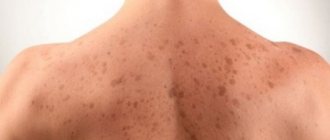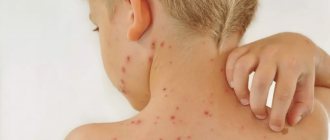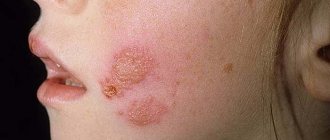Shingles: “adult” version of chickenpox
The first signs of herpes zoster, or “herpes zoster” in everyday life, begin not with the skin, as one might assume, but with a sharp pain in the ribs, often at chest level. Patients with this symptom are initially examined for cardiac pathologies and neuralgia. Whereas specific signs of the disease appear somewhat later.
Varicella variant
Few people know, but chicken pox and herpes zoster are different “masks” of the same virus.
Varicella-zoster (or herpes type 3) provokes chickenpox in children, and more often shingles in adults.
The peculiarity of the virus is that once it enters the body (for example, with chickenpox in childhood), the pathogen never leaves it. And it remains to “live” forever in the nerve fibers of the infected person, albeit under the strict supervision of immune forces.
If the immune system is intact and adequate, herpes may never manifest itself again. But weakening the body literally removes the guards from the “detention cell” and allows the virus to run rampant.
Signs of reactivation
The “awakened” herpes virus begins to actively multiply, provoking the immune system to “remember” its responsibilities.
This causes a classic inflammatory process, accompanied by sudden pain, often along the ribs, and after 2-3 days - redness of the skin and the appearance of “classic” herpetic blisters.
The blisters open over time and can merge with each other, forming a large wound surface. Which, in conditions of weakening of the body, is accompanied by prolonged healing and, often, the addition of a bacterial infection.
Such “stripes” of lesions are always one-sided, which is a distinctive feature of “lichen.” But the geography of location may vary.
Most often, the intercostal spaces of the chest or, less commonly, the lumbar region are hit. However, herpetic blisters may appear in the ear canal and on the face, indicating damage to the nerve fibers of the brain (trigeminal, facial nerve and others) and a high risk of severe neurological complications.
Diagnostics
In most cases, the characteristic symptoms of lichen allow a diagnosis to be made without any additional tests.
However, if in doubt, ask your doctor, or if you want to be examined yourself, you will need a blood test for antibodies.
Detection of IgA antibodies to the Varicella-Zoster virus confirms the reactivation of the pathogen.
And the presence of IgG is a marker of chickenpox and the presence of the virus in the body.
Other research methods, such as PCR diagnostics of rash elements, are not suitable for the examination itself, since they have a number of important nuances when collecting material. And only a dermatologist or venereologist can take the material correctly.
Herpes zoster virus
The frivolous word “chickenpox” is colloquially used to refer to chicken pox. This is a disease that is caused by the well-known herpes virus Zoster. However, unlike other diseases for which this virus is also to blame (for example, herpes causes a serious disease - shingles), chickenpox is undoubtedly a mild disease, it is not seriously ill and, as a rule, it goes away without consequences.
Chickenpox mostly affects children, often in entire groups. It is enough for one person to catch chickenpox, and the entire kindergarten group of children is already sitting at home - figuratively speaking, the infection seems to have been spread by the wind (maybe this is the clue to the name of the disease). Newborn babies, up to six months old, who are breastfed, develop temporary immunity (antibodies to this virus are transmitted through the mother's milk if she has previously had chickenpox).
The main symptom of chickenpox is a rash. Moreover, the rash appears everywhere - on the face, on the scalp, on the torso. In this case, the child may be lethargic and capricious. Some children develop a fever and may have a sore throat.
According to the apt expression of infectious disease doctors, the rash with “chickenpox” is sprinkled, that is, it appears many times over the course of 4-5 days.
The incubation period for chickenpox (the period of time from the moment the virus enters the body until the first signs of the disease appear) lasts from 10 to 21 days. Therefore, quarantine for chickenpox is 21 days.
Moreover, the patient becomes infectious a day or two before the first signs of the disease appear. Then it remains a source of infection for an average of 5-7 days after the last blisters appear.
At first the rash appears in the form of pale pink spots. Then these spots turn into bubbles filled with clear liquid, the contents of the bubbles become cloudy, and their surface wrinkles and becomes covered with brown crusts, which fall off only after a week or two. Spots, blisters, and crusts may be present on the baby’s body at the same time.
The infectiousness of chickenpox remains until the last scabs dry out. But after a child has had chickenpox, he usually has lifelong immunity to chickenpox.
In the normal course of the disease, chickenpox does not require treatment. The main thing is hygiene and good skin care for the child. The fact is that there is itching in the places where the blisters form, and the child can scratch them and introduce an infection into the wounds. Then suppuration will begin on the skin, the crusts will last a long time and leave behind pockmarks. Less commonly, the virus causes the development of chickenpox pneumonia and affects the soft meninges (encephalitis), heart and kidneys.
The mother should pay attention to the baby’s nails; they should be neatly trimmed. If the child is very small and cannot be distracted, it is better to put on cotton gloves or a blouse with closed arms. Change your child's underwear daily. It is better to use aging soft T-shirts and panties so as not to further injure the skin. Bed linen should also be soft. Do not wrap your baby up; sweat increases the itching. Give your child plenty of fluids. Be sure to consult with your doctor about what product to lubricate the blisters on the skin. For severe itching, your pediatrician may prescribe antihistamines. The mother will have to put aside her business and take care of the child so that he does not concentrate on the itchy skin. Postpone all previously planned trips with your child; now he should stay at home, even if he feels absolutely normal - your child can infect other children. It’s also better to call a doctor home.
Chickenpox is more severe in children with immunodeficiency and in children with allergies. In this case, drug therapy will be needed. You should see a doctor immediately if your child has a severe headache or persistent vomiting, unusual sleepiness or trouble breathing, or a cough that does not go away.
“Chickenpox” occurs when the body first encounters the herpes virus, but this may not be the last encounter. The child recovers, but the virus that is the culprit of the disease no longer leaves the body - it subsequently, many years later, under various stressful situations, can provoke a very painful inflammation of the nerve endings, which is accompanied by rashes similar to “chickenpox.” They appear along the nerves and cause severe pain.
The belief of some parents that it is even good that their child will get chickenpox in childhood is absolutely wrong - they say, it is better to get over this infection earlier. If it is possible to prevent an infectious disease, you should try to do this, because chicken pox is like any other infection. May cause any complications in an unexpected way.
There is a vaccine against chickenpox, and it is considered the best way to protect a child from the disease. It can be used both for planned prevention and for emergency prevention, in people who have not been sick before and happen to be close to the sick person. Vaccination is not included in the National Vaccination Calendar, but you can vaccinate your child with a vaccine you purchased yourself by contacting the vaccination office of the Nyagan City Children's Clinic, having previously coordinated your actions with your local pediatrician.
Questions about chickenpox: recurrent chickenpox, vaccinations and possible complications
Pediatrician
Morozova
Ekaterina Vyacheslavovna
17 years of experience
Pediatrician, Candidate of Medical Sciences, member of the Union of Pediatricians of Russia
Make an appointment It’s amazing how many more questions chickenpox left us with after we wrote two detailed articles: about chickenpox in children and about chickenpox for adults. Let's start in order:
Is it possible to get chickenpox a second time?
Yes, this is possible against the background of weak immunity. According to statistics, approximately 3% of people get chickenpox again. This is due to the peculiarity of immunity to chickenpox. And we need to dwell on this in more detail.
The fact is that immunity in chickenpox is “unsterile”. This term refers to a type of immunity in which the causative agent of the disease after an illness is not removed from the body, but remains in it. In the case of chickenpox, in a person who has had it, the varicella-zoster virus remains for life in the spinal ganglia, in the nuclei of the cranial nerves. Incredible, but true: we are protected from recurrent chickenpox because our body maintains a lifelong defense against the virus that is already inside us. And here there are two possible scenarios for the development of events in an unfavorable scenario. The first is the re-activation of the varicella-zoster virus, “sleeping” inside, against the background of a sharp weakening of a person’s immunity (usually after the age of 40-50 years). In this case, the disease does not manifest itself in the form of chickenpox rash, but in the form of herpes zoster, better known as “shingles.” The second scenario is re-infection with chickenpox from an external source, if the body at that moment does not have enough antibodies to chickenpox.
Most often, re-infection with chickenpox occurs in adults. But chickenpox happens again in children. At the same time, I would like to warn parents: if you see the same symptoms in a child who has previously had chickenpox, you should immediately consult a doctor, since these may be manifestations of another, similar disease.
What are the symptoms of recurrent chickenpox?
The first symptoms of re-infection with smallpox are: headache, sore throat, general deterioration of a person’s condition, fever. In most cases, the person does not even realize what is happening to them until a rash begins to appear on the skin a few days later. The disease itself lasts about three weeks.
The worst thing in this situation is that with repeated chickenpox, complications are possible, and smallpox itself is quite difficult to tolerate over the age of 10-12 years. But it is impossible to know whether you will get sick again or not.
What are the complications after chickenpox?
Complications of chickenpox sometimes include: gingivitis, stomatitis, purulent mumps, conjunctivitis, keratitis, otitis, sepsis, pneumonia, glomerulonephritis, encephalitis, myelitis, nephritis, myocarditis, keratitis, Reye's syndrome, arthritis, laryngitis.
But the most dangerous complication is the hemorrhagic form of chickenpox, in which vesicles (pimples) are filled with hemorrhagic (blood) contents, multiple hemorrhages appear in the skin or mucous membranes, nosebleeds or hemoptysis occur. And other complications, including cerebral edema.
If you have any symptoms of an atypical course of chickenpox, call a doctor immediately!
Chickenpox vaccination – to do or not?
This vaccination is not required. Many pediatricians believe that it is better for a child under 10-12 years of age to have chickenpox and develop their own immunity to it. But adolescents and adults, and especially women planning a pregnancy (but not yet pregnant), should think about getting vaccinated against the chickenpox virus, given the severity of this disease in adults and the danger to the fetus. Vaccination against chickenpox is carried out with Varilrix and Okavax vaccines.
There is an opinion that it is better to get vaccinated against chickenpox than to get sick with the virus, which will then remain in the body forever. We must be aware that vaccination is also the introduction of a live, weakened virus into the body. In fact, this is the same infection with a virus, but only weak. And just like with natural infection, after the incubation period, that is, one to three weeks after vaccination, you can often observe the appearance of a rash and an increase in temperature. This is how the body actively produces antibodies to the chickenpox virus. After which the virus remains forever in the body of the vaccinated person - just like in the person who has recovered from the disease.
Contraindications to the chickenpox vaccine are pregnancy and breastfeeding, as well as weakened immunity. Therefore, if a woman did not have chickenpox as a child, vaccination well before conception would be a wise decision.
Is it possible to have chickenpox without symptoms?
Asymptomatic chickenpox is indeed possible, although it is rare. More often it happens that one symptom is missing, while others are so blurred that they go unnoticed by parents. For example, it is possible to have chickenpox without fever - a child may have only a slight or short-term increase in body temperature that adults will not notice (especially if this happened at night while everyone was sleeping). And then only chickenpox rash will be detected. There may be chickenpox without a rash - that is, it seems to adults that there were no pimples at all, but in fact several chickenpox blisters were “hidden” in the scalp, or on the mucous membrane of the mouth, and you did not see them. And finally, it is possible to have chickenpox without itching - this symptom generally directly depends on the individual characteristics of the patient, so it is not at all necessary that chickenpox pimples will itch. In the rarest cases, it is possible that the parents did not notice the child’s temperature, did not find pimples, or found a couple of pimples, but did not understand that it was a chickenpox rash, the child did not itch, and a specific blood test showed immunity to the virus.
So, if, for example, there was chickenpox in kindergarten, everyone got sick with obvious symptoms, but your child did not, then three weeks after the outbreak of the disease it is worth checking his blood for antibodies to the chickenpox virus, taking a test for antibodies to the varicella-zoster virus . Perhaps the baby was ill, but asymptomatic. The test will show whether the child actually had chickenpox, whether it was recently or even earlier (but asymptomatic).
There is an opinion that if a child has had chickenpox with virtually no symptoms, he will definitely get it again. It's a delusion. Chickenpox is caused by a virus that enters the body, and once it has entered, the virus remains in the body for life. Therefore, it does not matter at all how intense the external symptoms of chickenpox were. If the virus has entered the body, you already have immunity from it. Actually, the chickenpox vaccine is based on the same principle: a weakened varicella-zoster virus is introduced into the body, after which the immune system produces antibodies to it (often with exactly the same, but greatly alleviated symptoms).
Detailed description of the study
Varicella-Zoster virus is a DNA-containing virus of the herpesvirus family, belonging to human herpesvirus type 3. The source of infection is a sick person or a virus carrier.
The virus causes shingles and chickenpox. Both diseases have a characteristic clinical picture and can therefore be diagnosed by external signs. After an illness, class G immunoglobulins to the virus remain for life.
Varicella (chickenpox) is more common in children and indicates a primary infection. In adults, the disease is more severe and complications occur more often.
Shingles is a process that indicates reactivation of the varicella zoster virus. It is observed when immunity decreases. After an illness, class G immunoglobulins remain for life.
Typical symptoms of chickenpox:
- the presence of a rash on the entire surface of the body;
- moderately severe skin itching;
- nonspecific phenomena (fever, weakness, headache)
Typical symptoms of shingles:
- unilateral rash;
- burning pain in areas of rash;
- intoxication syndrome (fever, weakness, headache)
In some cases, symptoms may be atypical: palsy of the VII pair of cranial nerves, cerebellar ataxia, deafness, dizziness. This requires additional diagnostic procedures to make a diagnosis.
Determination of IgG to the Varicella-Zoster virus (VZV) is also necessary when planning pregnancy. Chickenpox can adversely affect the development of the fetus and cause complications in the mother (pneumonia develops in 20% of cases). Therefore, if the result is negative, the woman is at risk and needs to be especially careful during pregnancy.
Pediatrician Mikhail Nikolsky: Herpes - to treat or not to treat
Alexandra Petrovskaya: Good afternoon. This is a program for the biggest ones. With us in the studio is pediatrician and candidate of medical sciences Mikhail Nikolsky. Mikhail Andreevich, hello.
Mikhail Nikolsky: Good afternoon.
A.P.: We have gathered here today about your scientific work on herpes types 6 and 7. Let's try to explain to the listeners what it is, and, most importantly, where these types come from, and what other types - the first, second, third and so on - go up to 6 and 7.
M.N.: In total, there are 8 or 9 types of herpes, depending on how you count. The first and second types are common herpes, which causes cold sores on the lips. The third type is the herpes zoster virus, which causes chickenpox or shingles in adults.
A.P.: So what we call chickenpox is, in fact, the same herpes?
M.N.: Not the same, it’s a completely different herpes, but also herpes.
A.P.: By what principle are they all united under this name?
M.N.: It's difficult. When scientists studied the DNA of these viruses, it turned out that they all had similar related features. The fourth type, Epstein-Barr virus, causes infectious mononucleosis. The fifth type is what everyone knows as cytomegalovirus. These are also often infections, mostly for children.
And finally, type 6 and 7 are what I do. Most often they cause roseola in children - a three-day fever or sudden exanthema. Next comes the eighth type of herpes, it occurs in Kaposi's sarcoma. This is a serious disease that predominantly occurs in HIV-infected patients.
A.P.: Besides the common name and some similarities in DNA, what else unites them? Maybe there are common methods of therapy or similar effects of the virus on the body?
M.N.: Firstly, unlike many other viruses, there is a medicine against herpes. This is what makes these viruses different from others in many ways because there are no cures for a huge number of viruses.
A.P.: What about all these fashionable antiviral drugs that are advertised everywhere?
M.N.: Everything that is advertised on TV is, unfortunately, most likely fake.
A.P.: Fakes are prohibited.
M.N.: Fakes are prohibited, but, apparently, advertising of drugs without proven effectiveness is allowed.
A.P.: This is a topic for a separate program.
M.N.: This is a problem for our country, because in our country fakes have even found their way into clinical recommendations. And we treat people with all these “bullshit drugs.” Moreover, we are obliged to treat them, because we have appropriate clinical recommendations.
A.P.: Is someone lobbying for this?
M.N.: Of course, this is lobbied for, it is paid for. And what to take if, excuse me, we have one of the members of the Russian Academy of Sciences - a homeopath.
A.P.: In these words you can feel your contempt for homeopathy.
M.N.: From the point of view of a clinical physician, to some extent, yes, contempt, this is true.
Let's return to herpes. They have a unique feature. After a person becomes ill with a primary herpes infection, these viruses do not leave the human body. All herpes that a person encounters in life remain with him forever.
A.P.: I came across the statement that it is difficult to meet a person on Earth over 10 years old who does not have antibodies to one or another type of herpes.
M.N.: And not only antibodies, but even the herpes themselves. In almost all people after a certain age, one or another herpes can be found in saliva, blood or other tissues. This is the problem with diagnosing them - doctors very often get confused. Colleagues, out of ignorance, but with the best intentions, prescribe, for example, saliva tests for frequently ill patients for the Epstein-Barr virus, cytomegalovirus, herpes type 6, type 7, and find them in the saliva. And this is the norm.
A.P.: Are they starting to treat?
M.N.: Yes, absolutely right. The patient does not know that this is the norm. He sees that he has a “terrible” test, that such and such a number of these herpes have been found, and the doctor, most likely, out of ignorance and lack of understanding of this problem, begins to treat normal carriers of herpes. And what does he treat? He treats with the same fuflomycins. And nothing happens.
A.P.: Bottom line – there is no need to treat herpes?
M.N.: It is necessary if it caused a serious illness - and all herpes in certain cases can cause serious illnesses. For example, herpes type 6 is a common cause of severe conditions in patients after a bone marrow transplant. If herpes after a bone marrow transplant has worsened against the background of a decrease, the actual destruction of one’s own immunity, then therapy necessarily requires powerful antiviral agents.
Well, take chickenpox – it would seem a harmless disease. But after 11 years it is difficult and can have consequences. Therefore, it is believed that if the patient is under 11 years of age, it often goes away on its own. And if you are over 11 years old, then it is better not to risk it, but to prescribe acyclovir.
A.P.: Is this a drug with proven effectiveness?
M.N.: Yes, it acts specifically on the chickenpox virus.
A.P.: It turns out that herpes, which is always in the body, at some point gets worse. For example, I heard about herpes type 6, that this is a typical disease for children under 2-3 years of age. It turns out that no.
M.N.: The fact is that herpes type 6 is the most common infection that always causes sudden exanthema or three-day fever or roseola. In principle, it is a very understandable infection: the child has a high fever for three days, then a typical maculopapular rash appears. Within two days it disappears on its own and the person recovers.
The infection itself can occur even through an ordinary kiss, as happens with many herpes. That is, the virus can enter the child’s body through contact with the saliva of the mother, grandmother, or any adult, who are usually the carrier of all herpes. And so the child suffers this primary infection through the human herpes virus type 6, and after that the human herpes type 6 remains in this child forever. And it won’t go anywhere, and there’s no way to get rid of it.
But it needs to be treated only in one situation - if it has caused some kind of serious illness, which almost never occurs in healthy people. Only for severe immunodeficiencies, which usually occur during organ and tissue transplantation. There are situations when intensive treatment of herpes type 6 is required.
In all other cases, there is no need to shock-treat it. And we must keep in mind that herpes is a very fashionable topic now. Herpes virus type 6 is easy to find, which means it can be presented for almost any disease as a possible diagnosis. And many doctors use this. For example: “I don’t know what’s wrong with you. Let’s look for what you definitely have.” And here is herpes type 6 - it definitely exists, and it is there.
A.P.: Another such moment. What other diseases can be associated with herpes viruses that are present in the body?
M.N.: As I already said, herpes types 6 and 7 “classically” cause roseola in children. Herpes type 6 and sometimes, but rarely, type 7 are also associated with febrile seizures in children. There are studies that show a connection between certain types of epilepsy and human herpes virus type 6. So it turns out that herpes type 6 actually causes a type of epilepsy.
A.P.: This virus is present in almost everyone’s body, but not everyone has epilepsy. That is, this suggests that there is no direct connection; there are other factors influencing the appearance of this disease?
M.N.: Of course, there are many factors here. For example, two people caught the same infection: but one had a runny nose, and the other had meningitis. But the infection is the same. Of course, there are many factors involved.
There was also a study that associated human herpes viruses 6 and 7 with other diseases, suggesting a link with multiple sclerosis. But this has not been proven. This is already a field of science, but we do not have clear indications that herpes is exactly what causes multiple sclerosis.
A.P.: During the program, we talked briefly about all herpes and outlined all the important points. And, concluding the conversation, I want to return to the beginning. What questions does science face today in this area?
M.N.: By the way, I forgot to say that a special form of human herpes type 6 is the chromosomal integrated form of this virus, when herpes type 6 is introduced into the human chromosome and begins to be inherited by all generations.
Now we have received a grant in St. Petersburg. We conduct free examinations of everyone for certain indications for the presence of chromosomally integrated human herpes type 6. It is precisely the presence of chromosomally integrated human herpes type 6 that may provide links with certain diseases. It turns out that almost 1% of the world's population has a chromosomally integrated virus built into its genome.
A.P.: Okay. Remembering my student years, what hypothesis do you have in this scientific research? If something, then what?
M.N.: We are currently recruiting a reference group, we are looking for people, we are examining them. I personally am now most interested in whether there are clinical manifestations of chromosomal integration of human herpes type 6 in newborns. In my opinion, this is the most interesting concept; no one in the world has yet developed this direction. So far there are preliminary results, but I’m not ready to announce them yet.
A.P.: Our guest was Mikhail Nikolsky, a pediatrician and candidate of medical sciences. Thank you and have a nice day everyone!
In general, no special treatment is recommended for children with chickenpox. Lotions such as calamine lotion can be helpful to relieve itching, while adults can also use antihistamine tablets. Oatmeal baths and wet compresses can also help reduce itching. Pain and fever should be controlled with paracetamol. Aspirin should not be used to relieve pain and/or fever in children.
For adults, people with weakened immune systems, and people who develop complications, antiviral drugs such as acyclovir are often prescribed. It is important to start treatment within 24 hours for it to be most effective.
Complications of chickenpox
In most cases, chickenpox resolves without complications. However, sometimes complications can occur. They are more common in unvaccinated people, infants, teenagers and adults, and in people of any age with weakened immune systems.
Possible complications of chickenpox include:
- Encephalitis (inflammation of the brain)
- Pneumonia
- Otitis media
- Secondary bacterial infections, especially of the skin
- Hepatitis, liver inflammation
Encephalitis, the most severe of these conditions, is rare and affects about one in a thousand people who get chickenpox, and can be life-threatening if left untreated. The condition occurs as a result of direct viral infection of the brain. Symptoms include headache, fever, confusion, altered mental states such as aggression or confusion, seizures, focal neurological changes (difficulty walking, uncontrolled eye movements, paralysis, loss of ability to express thoughts, read or write).
Chickenpox in newborns and infants
Because many people today have either had chickenpox or been vaccinated against it, most pregnant women exposed to someone with chickenpox are already immune to the disease. However, if a pregnant woman has not had chickenpox or been vaccinated against it, she should see a doctor immediately, as developing chickenpox during pregnancy can cause complications affecting both the parent and the baby.
Congenital chickenpox syndrome
If a pregnant woman develops chickenpox during the first 20 weeks of pregnancy, her baby may develop a very rare condition called congenital chickenpox syndrome. This happens rarely. The condition of the fetus can be monitored before birth using ultrasound.
Infants with congenital varicella syndrome may exhibit the following signs and symptoms:
- Low birth weight and preterm birth
- The head is smaller than average (microcephaly).
- Thickened, inflamed skin
- Underdeveloped or deformed limbs
- Eye diseases such as cataracts, inflammation and involuntary eye movements (nystagmus).
- Smaller eyes (microphthalmia).
Intellectual impairment and learning difficulties may appear later.
Chickenpox of newborns
If a pregnant woman gets chickenpox during the last three weeks of pregnancy, her baby may develop neonatal chickenpox. The disease can also be transmitted in the first days after birth, usually from the mother, but sometimes from other family members or visitors if the mother has not previously had chickenpox and has not passed on passive immunity (protective antibodies) to her baby. This condition tends to be severe because newborn babies have very immature immune systems and are not immune to chickenpox. Neonatal chickenpox is especially severe and can be fatal to the newborn when the baby's mother develops the chickenpox rash between five days before birth and two days later. Cases where the mother develops a rash four or more days after birth tend to be milder. This condition is treated with the antiviral drug acyclovir.
Prevention of chickenpox
Vaccination against varicella zoster virus is part of the regular vaccination schedule in many parts of the world. Following the recommended vaccination schedule can prevent many cases of chickenpox.
Adults who have never had chickenpox and have never received the chickenpox vaccine should consider vaccination, especially if they work or live with children. Women who have never had chickenpox should consider vaccination before trying to become pregnant.






